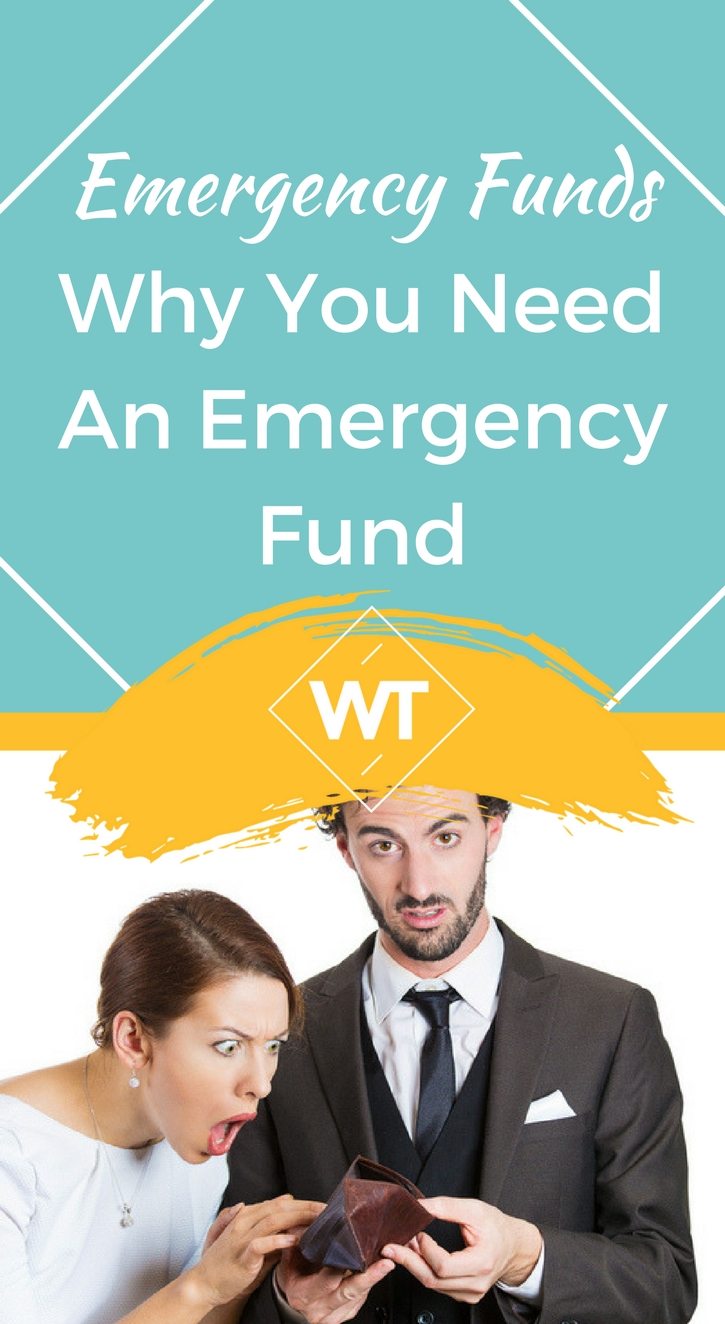Emergency Funds – Why you Need an Emergency Fund

Ever thought of setting aside spare funds or emergency funds? Most of us live in an imperfect world full of uncertainties and unforeseen events and happenings that can affect our life including our financial situation.
Emergency situations such as bad health, job loss, death, accident, etc can impact one’s finances and life in a dramatic way.
These unfavorable events can bring your life to a standstill, if one is not prepared adequately for the situation. For some of these situations, insurance can help you cover certain risks, while for a few other contingencies you may just have to plan for additional spare funds or savings to sail you through.
Savings – the first step
Let us know understand the building blocks of financial planning starting from the basic level. If we have to divide the overall financial planning in to three broad areas it would be:-
- Savings
- Investment
- Protection
Of course these are the basic components. Over and above this you will have things like tax planning, estate planning, etc. Our focus here will be on savings for short term emergency needs.
The core step in financial planning is to identify different ways to save your income. Once you have saved some surplus you can gradually invest, protect yourself from uncertainties and plan well for your future life goals such as retirement, vacations, marriage, etc.
However the above three areas are not necessarily separate and sequential, instead they can be achieved together.
Emergency funds – How much to save?
Generally the thumb rule is to save about 3-6 months worth of your average monthly expenses. This saving is also known as emergency funds or short term funds.
It is important to prepare a monthly income and expense budget to ascertain your pattern of incomes and expenses. If you cannot prepare a budget alteast you should have a rough diary that provides an estimate of your monthly budget. Here is a related blog on budgeting
For example take the case of Prakash, a software engineer whose monthly expenses are highly volatile. He prepares a budget and finds that his expenses in a month are about Rs.20000 in a lean season and Rs.30000 per month in a high expenditure season both of them are equally likely and spread equally throughout the year.
To have a realistic estimate he takes an average figure of Rs.25000 for estimating his required emergency savings. Going by this estimate Prakash will have to save or allocate between Rs.75000 to Rs.150000 as emergency savings (emergency funds)
How to save for contingencies? – The devil is in the details!
This is an elementary question some people might ask, but this is critical. Given that life provides you with full of choices, sometimes one gets lost in unimportant things and forget to attend to the most critical ones.
Once you have a budget or atleast a rough one, you will be able to identify if all your expenses are really essential or if there are few that can be controlled, curtailed or minimized. You can divide your expenses in to three parts – essentials (non-discretionary), discretionary and partly discretionary.
Discretionary expenses are the first evil that needs to be either eliminated or minimized. Here, I am not trying to say that one should not spend on vacations, picnics, movie outings, entertainment, etc because the emotional and psychological value associated with it is much more valuable than the money saved.
However, overindulgence in these expenses is as good as putting your money in trash. Moreover, these are not productive in nature and given that you can survive without these its good to minimize these expenses.
Follow these steps to save for emergency funds –
1. Eliminate or minimize discretionary expenses (movies, outings, entertainment, shopping, etc.)
- If you want to save around 3-6 months expenses it can take a lot of time and effort from your side. Even saving a month’s expenses could take a lot of time because your expenses can slow down your savings rate. Cutting discretionary spending can help you reach this goal.
- A little sacrifice on spending on luxury items, shopping, movies, etc can go a long way.
- Similarly giving up on bad habits such as smoking, drinking, drugs is not only good for your finances, but can dramatically change your health and wellbeing as well.
2. Control partly discretionary expenses (purchase of appliances, car, new furniture, etc.)
- When someone gets a pay hike there is a typical tendency to try to have a lavish party or buy expensive furniture or replace old appliances with swanky new ones. This is a typical poor man’s dream of becoming a millionaire.
- Instead of the above approach if one were to spend minimally on discretionary items and invest a good amount for the future, this would be the best gift or gesture that your family will appreciate over a period of time.
3 Manage essential expenditure well
- There are cases where essential expenditure still have scope for further control and potential for savings.
- For instance Shailesh, a Financial Analyst with a KPO discovered that KB’s Fair Price Shop offers a good deal on basic provisions such as wheat, rice, oils, grains, cereals, etc. This helped him during a gap of several months when he was between jobs post the Lehman Brother’s bankruptcy news shook the global markets.
- There are several ways to get deals on groceries, cell phone top ups, cable bills, etc. You can explore some of them to control these essential expenses and save a few thousands every month.
Emergency situation leading to a ‘Short Term Debt Trap’
Neha, a call center executive with a leading BPO in Gurgaon who was indulgent in spending on the best food, parties, shopping, movies, branded wear, etc enjoyed living life king size. She had three credit cards and two cell phones that few people of her age could boast of.
There were credit card collection agents knocking her door often. Added to this was a break up with a boyfriend. One thing lead to another and she tried to forget her worries by taking drugs, indulging in expensive food, binge drinking, etc. To add more salt to the wound, there was another bad news – her employer laid off a large team of people including her.
Due to extreme turn of events she lost her health and mental balance and had to be hospitalized. One fine day her parents rushed to visit her and decided to shift her to Pune, her home town, where she managed to find another position after a few months.
This is a clear case of living on the edge that needs to be avoided. If Neha had some emergency savings and lead a balanced life she could have averted all these problems.
Where to deploy my savings (emergency funds) ?
The objective of emergency funds is not for income or for investment for future. This is only to meet short term needs. However, one can still make a small additional income by diverting some portion of emergency savings to the most liquid and safest options. Your savings can be deployed in one or more of the following avenues.
- Bank savings account (highly liquid, 3.5% p.a.)
- Liquid Funds (< 3 months, 6-9% p.a.) with an option for premature withdrawal
- Short Term FDs (< 3 months, 5-7% p.a.) with an option for premature withdrawal
Take the case of Prakash we discussed above. If he manages to save 4 months expenditure he would have a savings of about Rs.1 lakh. When he looks at the above three avenues he feels liquid funds are the best. But he meets a Financial Advisor Shankar who recommends that about Rs.30000 can be kept in his bank savings account for any immediate and emergency needs anytime.
The remaining Rs.70000 can be invested in liquid funds and FDs i.e. Rs.40000 and Rs.30000 respectively, which can be withdrawn if required, else they can be deployed to earn interest.
The most important point is to ensure that the liquid fund or fixed deposit has a provision for premature withdrawal (in case of emergency) and charges a nominal (minimal) penalty for the same.
If Prakash were to put all his money in the savings account he would earn a paltry 3.5% while the inflation rate is about 7% (WPI) on an average in a year in India. The returns from these savings cannot beat inflation but atleast help you keep pace with inflation and meet your regular needs.
Reviewing your Emergency Needs
Money loses its value overtime, hence it is important to reevaluate and reassess your emergency needs after a period of time. Secondly, if the economic environment or your personal situation changes, you may have to provide for more funds for emergency needs.
For instance when a couple expects their first child, the father will no have to plan for additional emergency needs including those of the child.
If he had been saving just 3 months expenses, he may now have to stretch this further to 5/6 months’ equivalent amount. Moreover, the monthly average expense will also go up due to the addition of a kid in the family.
The emergency funds requirement can also change based on individual profile and attributes such as personal responsibilities, dependants, age, financial situation, etc.
Crisis Situations
Similarly during an economic slump such as sub prime crisis in US, debt crisis in Middle East, etc., one can try to break the 3-6 month thumb rule and try to save about 9 months’ expenses or more to withstand any eventuality.
Apart from economic crisis in the country or globe there can be crisis in the family due to death, loss of job, divorce, disputes, etc. In these though times your emergency funds have to he hiked to match the needs of the situation at hand.
Incomes with irregular cash flows – self employed, businessmen, etc.
There are several professionals such as doctors, advocates, consultants, businessmen, etc. who may be working as businessmen or as self employed professionals.
For these people although incomes could be very good, it can be irregular when compared to salaried employees. People who fall under this category or profile need to plan for alteast 9-12 months of emergency reserve funds to survive any eventuality. In fact a 12 months’ reserve is highly recommended by financial planning experts.
A salaried employee can resign or get laid off from a job and can find other employment options overtime. But closing down a business or professional set up is not easy, because there are clients and various stake holders involved. In most cases self employed professionals try to wait for a recovery or they make changes to their business strategy, operations, process, etc to get better income in future. These initiatives can take several months to materialize, hence a year’s reserve is recommended for self employed professionals and businessmen.
Conclusion
The bottom line here is to understand that emergency funds are meant for potential short term needs. One has to save about 3-6 months worth of expenses at any point of time as emergency savings. The recommended emergency savings for self employed or business people would be higher given their irregular income streams.
The aim of short term savings is to meet immediate needs at short notice, and not for the purpose of income or investment. However, some portion of savings which earn low yield on savings accounts can be deployed in short term fixed deposits or liquid funds to earn higher yield.
During unfavorable economic cycles an individual should think about increasing the emergency reserve funds to meet any eventuality. Remember that building an emergency need not be a one time process, rather it can be accumulated in stages.
For instance Prakash may not be able to accumulate Rs.1 lakh worth of emergency funds within a month or two. However, if he manages to save around Rs.15,000 every month he would be reaching his target in 7 months.
So just like systematic investment plans if one regularly saves and accumulates emergency funds, this corpus would grow and serve as a good emergency savings fund, which can protect you from any short term eventualities.









Leave a Reply